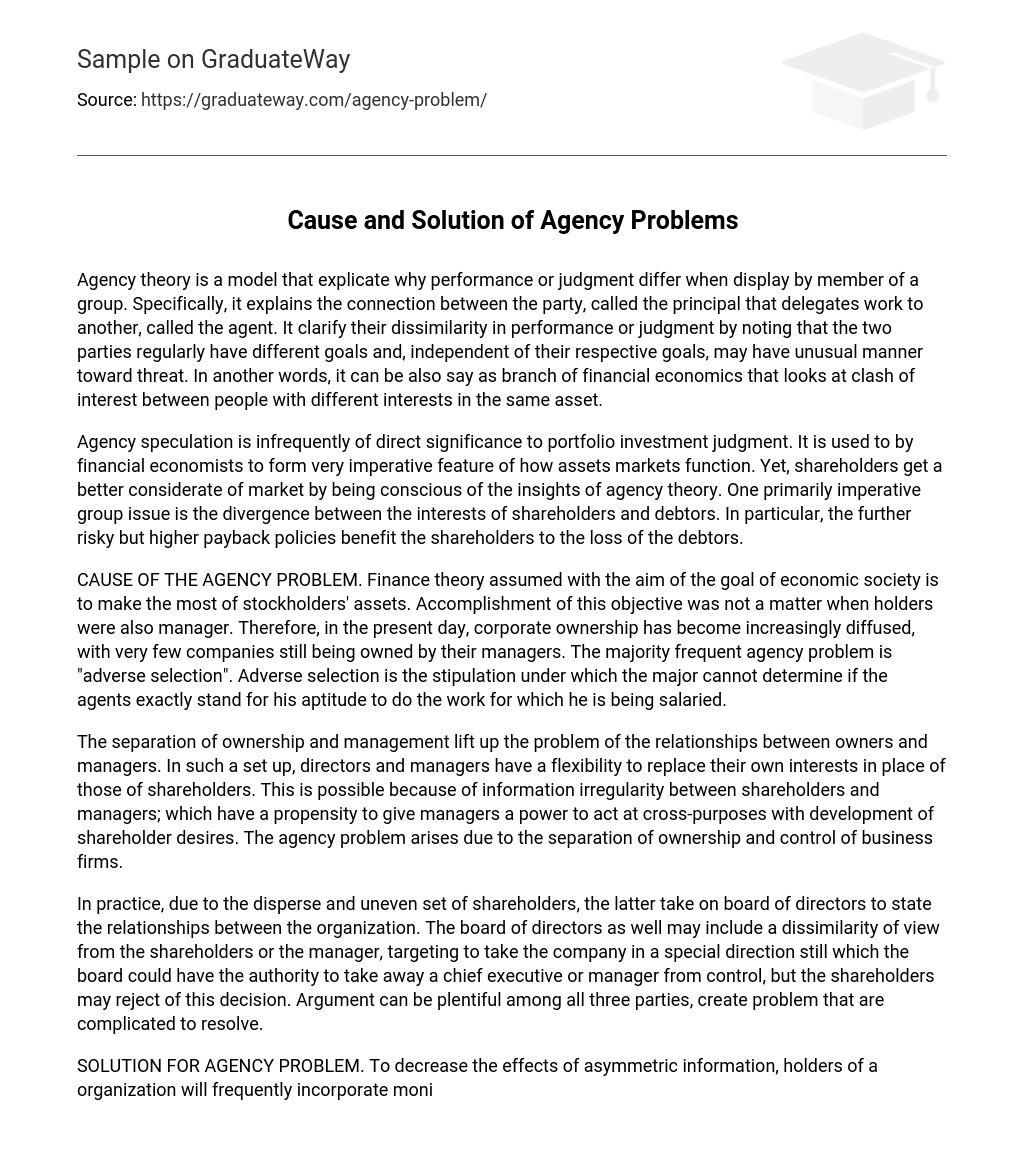Agency theory, a branch of financial economics, is a model that delves into the reasons behind differences in performance or judgment within a group. The theory revolves around the relationship between two parties: the principal and the agent. The principal delegates work to the agent, but disparities arise due to their divergent goals and approaches towards risk. This theory sheds light on conflicts of interest among individuals with varying interests in a shared asset.
Agency speculation is important in comprehending the functioning of asset markets, albeit not directly impacting portfolio investments. Financial economists employ it to acquire essential insights into market dynamics. Familiarity with agency theory enables shareholders to attain a deeper comprehension of the market. An important aspect within this theory is the discrepancy between shareholders’ and debtors’ interests. In particular, shareholders frequently gain from riskier yet more profitable strategies, which can result in losses for debtors.
The agency problem is caused by the assumption in finance theory that the goal of economic society is to maximize the assets of stockholders. This assumption was not problematic when stockholders were also managers. However, in modern times, corporate ownership has become more widespread, with few companies still being owned by their managers. The most common issue in agency problems is “adverse selection”. Adverse selection occurs when the principal is unable to accurately assess whether the agents possess the skills necessary for the job they are being paid for.
When ownership and management are separate, the issue of relationships between owners and managers arises. Directors and managers have the ability to prioritize their own interests over those of the shareholders in this scenario. This is facilitated by the asymmetry of information between shareholders and managers, allowing managers to behave in ways that may not correspond with shareholder preferences. The agency problem surfaces as a result of the disconnection between ownership and control within business firms.
The board of directors is responsible for managing the relationships between the organization’s shareholders, despite potential differences in perspectives with both shareholders and managers. Their goal is to guide the company in a specific direction. However, the board holds the authority to remove a chief executive or manager from control, which may face opposition from shareholders, leading to disagreements among all three parties and creating challenging problems that are hard to resolve.
SOLUTION FOR AGENCY PROBLEM. In order to mitigate the impact of unequal information, stakeholders of an organization often incorporate monitoring mechanisms to closely observe agents. However, complete monitoring of agents is not achievable. Monitoring behaviors such as setting budgets, implementing spending limits, and ensuring proper tax accounting help in overseeing agents. However, shareholders find it nearly impossible to monitor every executive action, creating a potential moral hazard problem where agents may engage in undisclosed actions for personal gain.
To mitigate agency conflict and the moral hazard problem, shareholders must incur agency costs – expenses incurred to incentivize managers to prioritize the organization’s stock price over their own self-interests. The concept of agency costs aims to assess the impact of differing goals and information flow between managers and shareholders on overall organizational effectiveness.
The theories of agency cost examine the differing perspectives that shareholders, executives, and bondholders have on their relationships with an organization. One common approach is to link a portion of management’s compensation to the success achieved for shareholders through bonuses, stock ownership, and options grants.
The aforementioned actions are not effective because they do not fully compensate managers for asset production and do not serve as effective motivators for risk-averse managers. In addition, utilizing share decision in managerial compensation strategy is commonly regarded as one of the most efficient ways to align the interests of managers and shareholders. With this approach, managers are rewarded with shares for their performance, which enhances shareholder assets.
Such alternatives give administration the authority to purchase company stock at a fixed price at specified times in the future. For example, when ownership of the organization by inside managers increases, so does their incentive to invest in positive net present value (NPV) projects and reduce personal gratuity expenditure. The greater the firm’s value, the greater the opportunity for managers to earn and carry out these actions.
CONCLUSION: It is evident that agency problems exist within the company sector.
The range of agency argument can differ between organizations. Therefore, there is still hope for shareholders as various mechanisms, both statutory and non-statutory, can be utilized to minimize the damage caused by agency problems. Every form of authority and other mechanisms discussed in this solution are important for reducing the costs associated with the separation of ownership and management, and provide protection for investors.





